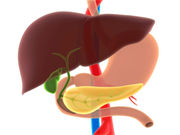Systemic inflammation response index can predict time to progression and overall survival
MONDAY, May 16, 2016 (HealthDay News) — For patients with advanced pancreatic cancer receiving chemotherapy, the systemic inflammation response index (SIRI), based on peripheral neutrophil, monocyte, and lymphocyte counts, can predict survival, according to a study published online May 6 in Cancer.
Qi Qi, M.D., from the Fudan University Shanghai Cancer Center, and colleagues developed the SIRI in a training set of 177 patients with advanced pancreatic cancer who had received palliative chemotherapy. The predictive ability was validated in two independent cohorts with 397 patients.
The researchers found that in the training cohort, patients with a SIRI ≥1.8 had a shorter time to progression (TTP) than patients with a SIRI <1.8 (hazard ratio, 2.348; P = 0.003); they also had shorter overall survival (OS) (hazard ratio, 2.789; P < 0.001). The two independent validation cohorts had comparable TTP and OS findings. SIRI was confirmed as an independent prognostic factor for TTP and OS in multivariate analysis. An increase in SIRI at week eight, compared with no change, correlated with poor TTP and OS; in contrast, a decrease in SIRI correlated with improved outcomes.
“The SIRI can be used to predict the survival of patients with pancreatic adenocarcinomas who receive chemotherapy, potentially allowing clinicians to improve treatment outcomes by identifying candidates for aggressive therapy,” the authors write.
Copyright © 2016 HealthDay. All rights reserved.








